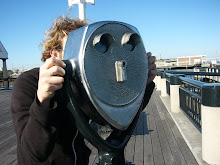In the newspaper business, we've become pretty used to the steady drum beat of bad news. It's about as common a fact of life now as the accusations of left-leaning bias (this is true, by the way. Thanks to seismological factors and unbalanced weight distribution from the construction of our new press, the building does in fact lean slightly leftwards. The advertising department tends to lean northward, the parapets tilt south and the minarets vote Republican) and opening up my inbox the day after writing a story about immigration to find several people accusing me of smuggling Guatemalan refugees in the back of my Ion. Slashed Christmas parties, rapidly shrinking news hole, eliminated columnists, smaller annual raises, decreasing resources, etc. etc. on until morning. It's all a wild and woolly experiment in minimalism, and I'm excited to be a part of it.
But this week came the biggest wet slap of bad news to hit the company yet, and I think it resonated with everyone like the start of a particularly nasty terminal cancer diagnosis. Layoffs of about 1,400 employees (10 percent of the total workforce) throughout the company would be needed to help tamp down the mounting debt and other financial problems that are crippling the newspapers, which, according to Corporate, has nothing at all whatsoever in any way to do with the purchase of Knight Ridder in 2006. Why would you even ask that?
So we lost a reporter and an ad person at our paper, relatively minor compared with the 200+ people cut from the Miami Herald. I returned from Bonnaroo on Tuesday and the newsroom had a somber, funeral parlor vibe. Hannah made "At Least We Still Have Our Jobs" cupcakes to try to cheer everyone up, which, I might add, is more than any of the bosses did to raise morale.
Everyone's whispering in the corners of the newsroom about what their plan Bs are, and whether there will be more cuts, which seems inevitable since these aren't even expected to make a significant dent in the shortfall. Waiting tables and professional derby girl seem to be the lead options right now.
The underlying sadness of all of this is not the loss of a few jobs, the lack of overtime pay or any of that other day-to-day stuff. That's all just a faucet dripping into the 500-year flood problem we're facing: as newspapers die, so does a key part of the nation's curiosity and public
 conversation. New media still have yet to step up and fill in the crucial investigation, public affairs and general broad information-finding role of newspapers. And the worst part is, the public seems perfectly content to remain uninformed. David Simon (Terp!) put it best in his brilliant op-ed for the Post: "Isn't the news itself still valuable to anyone? In any format, through any medium -- isn't an understanding of the events of the day still a salable commodity? Or were we kidding ourselves? Was a newspaper a viable entity only so long as it had classifieds, comics and the latest sports scores?"
conversation. New media still have yet to step up and fill in the crucial investigation, public affairs and general broad information-finding role of newspapers. And the worst part is, the public seems perfectly content to remain uninformed. David Simon (Terp!) put it best in his brilliant op-ed for the Post: "Isn't the news itself still valuable to anyone? In any format, through any medium -- isn't an understanding of the events of the day still a salable commodity? Or were we kidding ourselves? Was a newspaper a viable entity only so long as it had classifieds, comics and the latest sports scores?"There was a time in J-school before graduation when everyone talked about the big metro dailies they'd end up at, the years of papercuts and ink stains and harassment by city editors we'd suffer along the way, all with very little concern for our own financial prosperity or even public recognition. The rush was in the thwack of a newspaper against the front door in the morning containing the latest break in a case, the scandalous truth about public folly or just the power of storytelling that forced people from disparate communities to relate to one another through shared experience. The rush is still there for those who charge after it, but the people in corporate offices or on the street who have the power to protect and foster it are getting washed away in the flood.
UPDATE: Despite the fact that Orage Quarles is among the most awesomest of southern names that exists, this pretty much underscores the whole point.




No comments:
Post a Comment